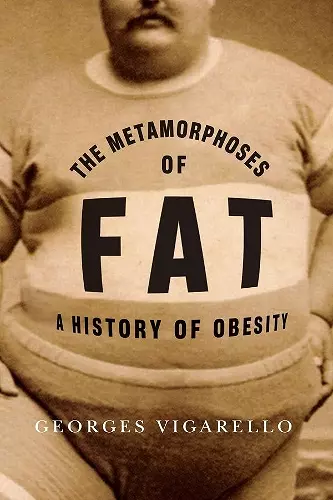The Metamorphoses of Fat
A History of Obesity
Georges Vigarello author C Jon Delogu translator
Format:Paperback
Publisher:Columbia University Press
Published:9th Sep '16
Currently unavailable, and unfortunately no date known when it will be back

In The Metamorphoses of Fat, Georges Vigarello maps the evolution of Western ideas about fat and fat people from the Middle Ages to the present, focusing on the formative influence of science, fashion, fitness crazes, and public health campaigns. While hefty bodies were once a sign of power, today those who struggle to lose weight are considered poor in character and weak in mind. Vigarello traces the eventual equation of fatness with infirmity and examines the way we have come to define ourselves and others in terms of body type.
Tracing the link between changing attitudes toward body size and modern conceptions of class, society, and self.Georges Vigarello maps the evolution of Western ideas about fat and fat people from the Middle Ages to the present, paying particular attention to the role of science, fashion, fitness crazes, and public health campaigns in shaping these views. While hefty bodies were once a sign of power, today those who struggle to lose weight are considered poor in character and weak in mind. Vigarello traces the eventual equation of fatness with infirmity and the way we have come to define ourselves and others in terms of body type. Vigarello begins with the medieval artists and intellectuals who treated heavy bodies as symbols of force and prosperity. He then follows the shift during the Renaissance and early modern period to courtly, medical, and religious codes that increasingly favored moderation and discouraged excess. Scientific advances in the eighteenth century also brought greater knowledge of food and the body's processes, recasting fatness as the "relaxed" antithesis of health. The body-as-mechanism metaphor intensified in the early nineteenth century, with the chemistry revolution and heightened attention to food-as-fuel, which turned the body into a kind of furnace or engine. During this period, social attitudes toward fat became conflicted, with the bourgeois male belly operating as a sign of prestige but also as a symbol of greed and exploitation, while the overweight female was admired only if she was working class. Vigarello concludes with the fitness and body-conscious movements of the twentieth century and the proliferation of personal confessions about obesity, which tied fat more closely to notions of personality, politics, taste, and class.
Vigarello offers up a grande bouffe of food for thought, tracing the impact of evolving mores and medicines on society's perception of an often stigmatized condition. Nature Vigarello masterfully traces...the stigmatization of the fat person over time. Times Literary Supplement Overall, a useful resource on the sociology and history of obesity... Choice At once compelling and ground-breaking... this work represents all that is best in new histories of the body. Modern Language Review A brilliant piece of work... A great opening point to the many opaque aspects of the consequences of body size for the fate of individuals and societies for future historians to explore. Social History of Medicine Enjoyable and useful. Vigarello manages to deliver an impresive amount of material in less than two hundred pages... Thought-provoking and entertaining. Bulletin of the History of Medicine The most impressive history of corpulence to date... essential reading for anyone wishing to understand how our modern preoccupations with size, weight, health, beauty, and morality have changed over time. American Historical Review In short, the breadth and detail of the account presented here provides a valuable resource for researchers to begin to understand the multiplicity of approaches to fatness over time. Antipode: A Radical Journal of Geography Exceptionally well organized and presented, The Metamorphoses of Fat is a unique and seminal work of outstanding scholarship that is unreservedly recommended. Midwest Book Review
ISBN: 9780231159777
Dimensions: unknown
Weight: unknown
296 pages